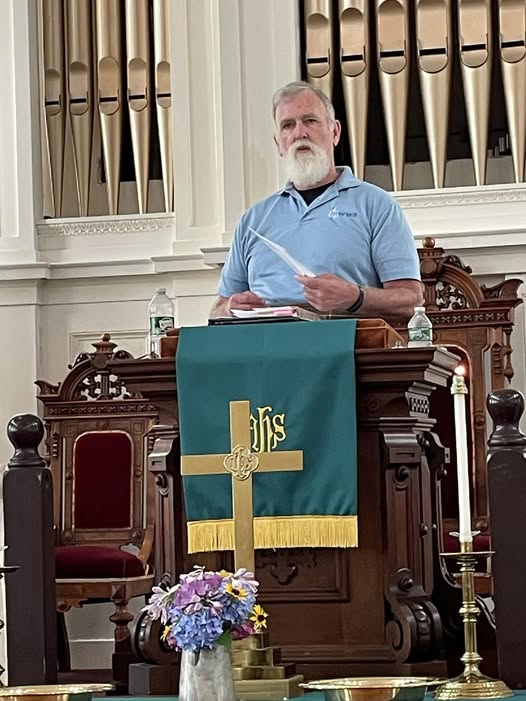Sermon Sunday July 13th, 2025
Robert Sims, Guest Speaker
Luke 10: 25-37
We’ve talked before about asking for help. Did the man speak or ask for help? It seems than he didn’t. The road from Jerusalem to Jericho was historically dangerous.
Martin Luther King and his wife did a pilgrimage to the Holy Land and drove a car along the road. Even 2,000 years later it looked like an ominous trip. King described it as narrow winding roads with many hiding spots.
What about the players?
Priest – references said it was a Jewish priest
Levite – states that it’s a student of the laws, a member of the tribe of Levi and performed duties of the assistant of the Priests. Including Levi, Moses, Samuel
Why did they act the way they did?
In Jewish culture, contact with a dead body was understood to be defiling.[8] Priests were supposed to avoid uncleanness.[8] The priest and Levite may therefore have assumed that the fallen traveler was dead and avoided him to keep themselves ritually clean.[8]
On the other hand, the depiction of travel downhill (from Jerusalem to Jericho) may indicate that their temple duties had already been completed, making this explanation less likely,[28] although this is disputed.[20] Since the law made an exception for neglected corpses,[20] the priest and the Levite could have used the law to justify both touching a corpse or ignoring it.[20]
In any case, passing by on the other side avoided checking “whether he was dead or alive”.[29] Indeed, “it weighed more with them that he might be dead and defiling to the touch of those whose business was with holy things than that he might be alive and in need of care.”[29]
Jesus could have made references to other religions or nationalities, but specifically addressed this parable to Jews, their leadership and their interpreters of the law.
There’s be a lot of sermons about this scripture. Most of the messages I’ve heard dealt with how important it was to take care of people in need. How not to be like “the bad guys” in this story. I had the thought to look at it a little different.
What happened to the Priest and Levite after this event?
Did they continue in the hardened and fearful ways?
Did they second guess their decision? Did they feel guilt or remorse?
Did this event change them in the future?
Which is a more likely outcome? Both seem reasonable, but humans are creatures of habit and find change difficult. I’d like to have hope and say they took stock of themselves and did change.
Where has this happened before?
Nicodemus (John 3 1-21) – Member of the Sanhedrin, known for not being particularly “just”.
Zaccheus (Luke 19 v 1-10) – Treacherous and hated tax collector that climbed a tree to be seen by Jesus. Jesus ate with him, listened to his remorse and forgiveness, watched him pay back people he cheated and became a follower.
Moses (Exodus v11-15) – As the “son” of Pharoah, he certainly lived a lavish life. A life that was supported by the enslavement of Jews. One can only imagine the mistreatment that occurred under his directives. At one point though, he saw an Egyptian mistreating and attempting to kill a Jew. Moses killed the abuser, hid the body and ran away. Later called by God, he clearly followed a righteous path after his misdoings.
David (2 Samuel 12) – This is one of the few I remember learning as a child. Everyone talked about how great David was, the whole Philisten thing… but then there’s the part about how he had an affair with his friend’s wife. Worse even, he then sent the friend into battle. He told others to let him lead the battle risking his life.. where he was killed. David certainly had his moments of dishonesty, but turned his life around.
Saul to Paul (Acts 9) – Likely the biggest turnaround of all… Saul. Saul was a bad dude! He hunted Christians, tortured, and killed then. On the road to Damascus, the Lord appeared to him and asked him, “Why do you persecute me?” After this interaction he was blind for 3 days. Blind until Ananias laid hands on him and his sight was restored. After that… came the rest of the story, traveled widely spreading the word and authored 13 books of the Bible. Quite the conversion.
Each of these are known as stalwarts in the Bible. Their previous indiscretions are there, but have become part of the story of enlightenment, growth and faith in the way. We don’t think of them as the bad guys, because we get to know what happened after.. For the Priest and Levite, what happened to them? Who knows.
I can only speak for myself, but there was a time in my life that I wasn’t particularly “Christian”. I might have checked 5 commandments off my list…
But this is the beauty of the story, it doesn’t have to end when we metaphorically walk by the beaten person. Whatever form the “beaten” takes – homeless, abused, PTSD, addict, immigrant… we don’t have to live with our guilt.
We can change, we can make ourselves better, we can be more like Christ.
We can heal from “I wish I had stopped and checked on that p


